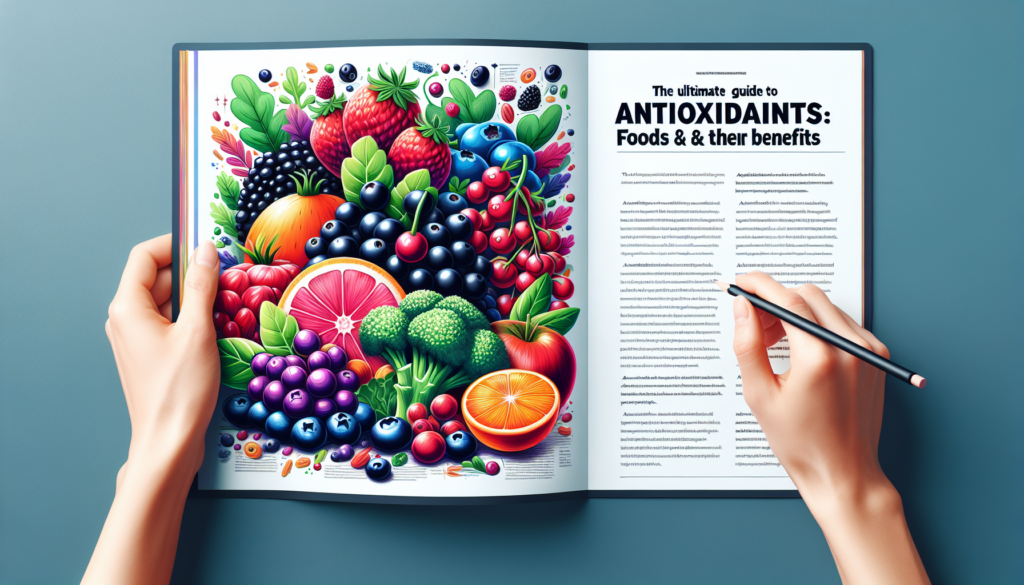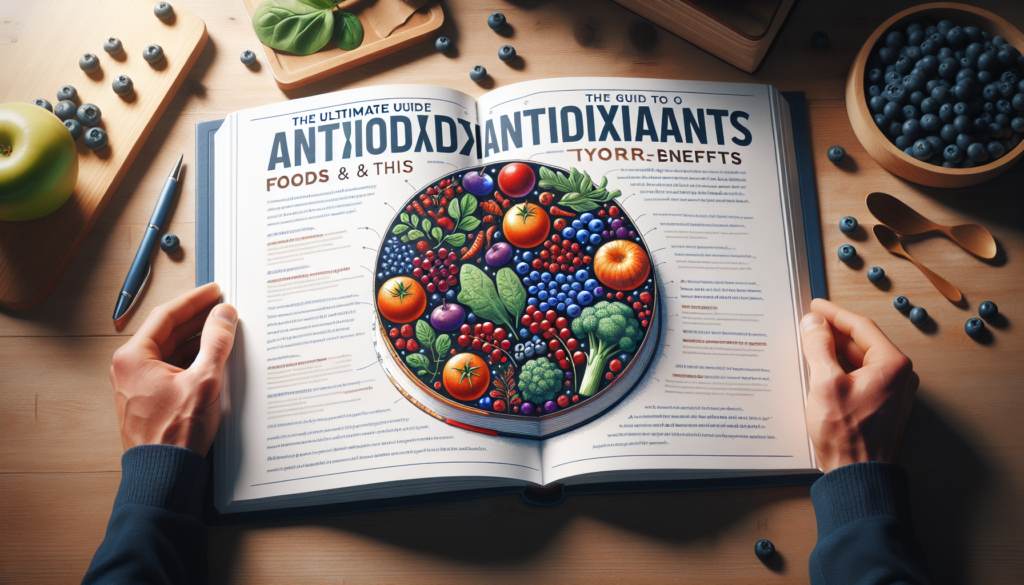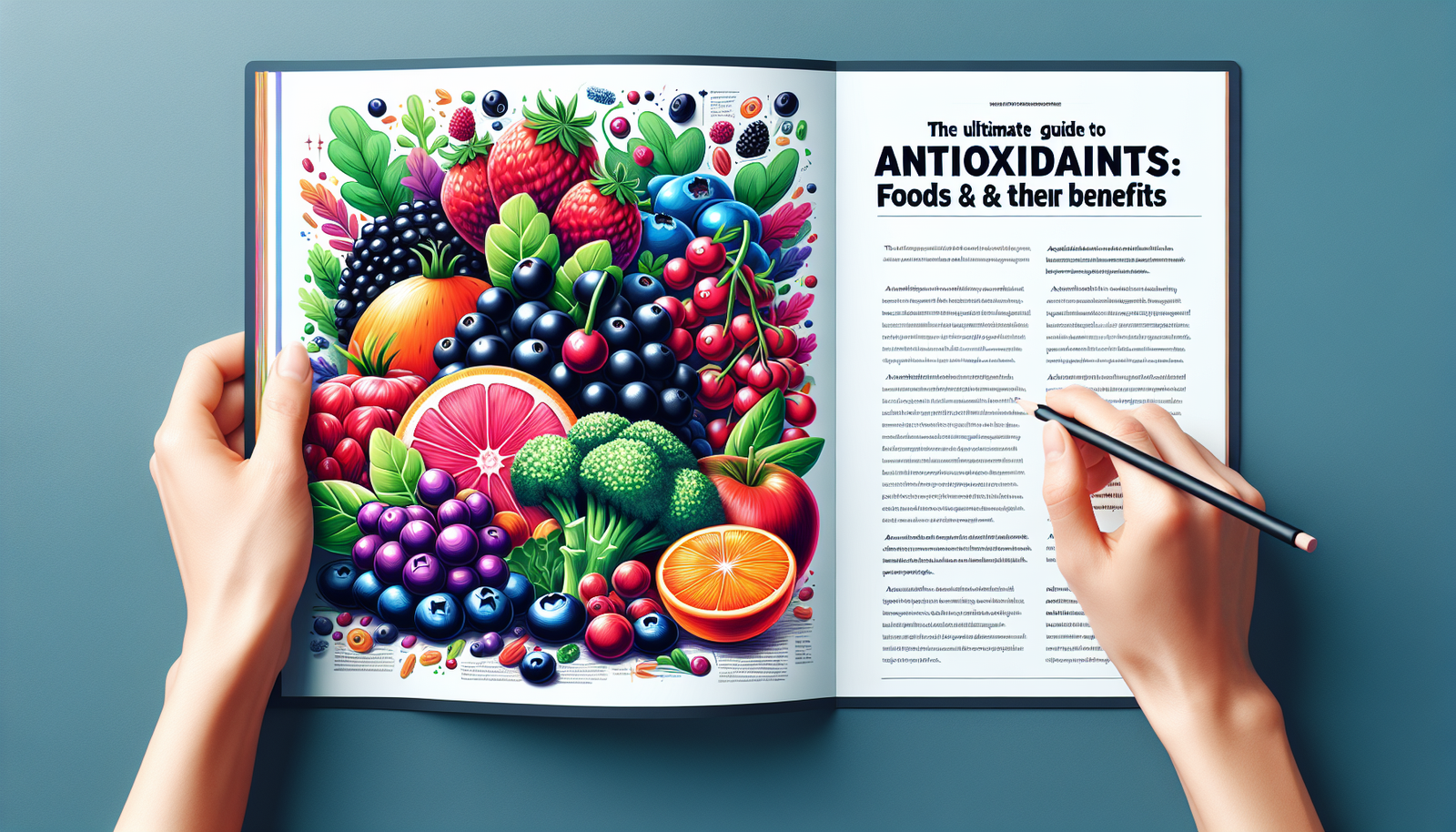Whether you’re a health enthusiast or simply looking to make positive changes to your diet, understanding the power of antioxidants is essential. This ultimate guide highlights the importance of antioxidants and provides a comprehensive list of antioxidant-rich foods, along with their incredible health benefits. From the vibrant and juicy berries to the nutritious leafy greens, discover how integrating these antioxidant-packed foods into your daily routine can contribute to a healthier, more vibrant you. Get ready to unlock the secrets to boosting your immune system, fighting off free radicals, and promoting overall well-being!

What are antioxidants?
Definition of antioxidants
Antioxidants are substances that play a crucial role in protecting our bodies against harmful molecules called free radicals. Free radicals are highly reactive molecules that can damage cells and contribute to the development of various diseases. Antioxidants work by neutralizing free radicals, thereby preventing them from causing damage to our bodies.
How antioxidants work
Antioxidants work by donating an electron to free radicals, which helps stabilize them and prevent them from causing harm. They essentially act as scavengers, seeking out free radicals and neutralizing them. By doing so, antioxidants help reduce the damage caused by oxidative stress, which is an imbalance between the production of free radicals and the body’s ability to detoxify them.
Different types of antioxidants
Vitamin C
Vitamin C, also known as ascorbic acid, is one of the most well-known antioxidants. It is found in various fruits and vegetables, such as oranges, strawberries, and bell peppers. Vitamin C helps protect cells from damage, supports the immune system, and aids in the production of collagen, a protein important for healthy skin.
Vitamin E
Vitamin E is a fat-soluble antioxidant that is found in nuts, seeds, and vegetable oils. It protects cells from oxidative damage and helps maintain the integrity of cell membranes. Vitamin E also has anti-inflammatory properties and is known for its benefits to heart health.
Beta-carotene
Beta-carotene is a pigment that gives fruits and vegetables their vibrant orange, red, and yellow colors. It is converted into vitamin A in the body, which acts as an antioxidant. Foods rich in beta-carotene include carrots, sweet potatoes, and apricots. Beta-carotene plays a role in maintaining healthy skin, promoting good vision, and supporting immune function.
Selenium
Selenium is a trace mineral that acts as a vital antioxidant. It helps protect cells from damage, supports thyroid function, and plays a role in the immune system. Good food sources of selenium include brazil nuts, seafood, and eggs.
Flavonoids
Flavonoids are a diverse group of antioxidants found in various plant-based foods such as fruits, vegetables, and tea. They have been shown to have anti-inflammatory and antioxidant properties. Some common flavonoids include quercetin, catechins, and anthocyanins.
Polyphenols
Polyphenols are a category of antioxidants that are found in many plant-based foods. They have been linked to numerous health benefits, including reducing the risk of chronic diseases. Polyphenols can be found in foods like berries, apples, cocoa, and green tea.
Top antioxidant-rich foods
Berries
Berries, such as blueberries, strawberries, and raspberries, are not only delicious but also packed with antioxidants. They are rich in various types of antioxidants, including vitamin C, flavonoids, and anthocyanins. Adding berries to your diet can help protect against chronic diseases and support brain health.
Green leafy vegetables
Green leafy vegetables, like spinach, kale, and Swiss chard, are excellent sources of antioxidants, particularly vitamin C and beta-carotene. These vegetables also contain other beneficial compounds, such as lutein and zeaxanthin, which are crucial for eye health. Including green leafy vegetables in your meals can provide a wide array of antioxidants and nutrients.
Nuts and seeds
Nuts and seeds, such as almonds, walnuts, chia seeds, and flaxseeds, are not only rich in healthy fats but also contain antioxidants like vitamin E and selenium. These antioxidants help protect against oxidative stress and promote heart health. Incorporating nuts and seeds into your diet as snacks or toppings can provide a significant antioxidant boost.
Brightly colored fruits
Brightly colored fruits like oranges, mangoes, and papayas are rich in antioxidants like vitamin C and beta-carotene. These antioxidants play a vital role in supporting immune function and maintaining healthy skin. Adding a variety of colorful fruits to your diet ensures a diverse range of antioxidants.
Beans and legumes
Beans and legumes, such as black beans, chickpeas, and lentils, are fantastic sources of antioxidants and other beneficial compounds. They contain flavonoids, polyphenols, and fiber, all of which contribute to their antioxidant properties. Consuming beans and legumes regularly can support heart health and help manage blood sugar levels.
Dark chocolate
Dark chocolate, specifically the type with a high cocoa content (70% or more), is rich in antioxidants called flavanols. These antioxidants have been shown to have numerous health benefits, including reducing inflammation and improving heart health. Enjoying a small portion of dark chocolate as an occasional treat can provide a delicious and antioxidant-rich indulgence.
Benefits of antioxidants
Protection against free radicals
One of the primary benefits of antioxidants is their ability to neutralize free radicals and protect our cells from damage. By neutralizing free radicals, antioxidants help prevent oxidative stress, which can contribute to various diseases, including heart disease, cancer, and neurodegenerative disorders.
Reduced risk of chronic diseases
Numerous studies have shown that a diet rich in antioxidants is associated with a reduced risk of chronic diseases. Antioxidants help combat inflammation, reduce oxidative stress, and strengthen the immune system. By reducing these risk factors, antioxidants play a vital role in preventing conditions such as cardiovascular disease, diabetes, and certain types of cancer.
Improved skin health
Antioxidants, particularly vitamin C and vitamin E, are essential for maintaining healthy skin. They help protect the skin from damage caused by UV rays, pollution, and other environmental factors. Antioxidants also aid in collagen production, which is crucial for maintaining skin elasticity and reducing the appearance of wrinkles and fine lines.
Enhanced immune function
Antioxidants play a critical role in supporting the immune system. They help protect immune cells from damage caused by free radicals and promote their optimal functioning. By bolstering the immune system, antioxidants help ward off infections and enhance overall health.

Antioxidants and aging
Role of antioxidants in slowing down aging
As we age, our bodies naturally experience oxidative stress, which can contribute to the aging process. Antioxidants help counteract the effects of oxidative stress by neutralizing free radicals. By doing so, they can help slow down the aging process and reduce the risk of age-related diseases.
Effects of oxidative stress on the aging process
Oxidative stress can lead to the accumulation of damage in cells and tissues throughout the body, which can contribute to various age-related diseases such as cardiovascular disease, Alzheimer’s disease, and certain types of cancer. By reducing oxidative stress, antioxidants help protect against these diseases and promote healthier aging.
Antioxidants and heart health
Lowering risk of heart diseases
Antioxidants, particularly vitamin E and flavonoids, play a crucial role in promoting heart health. They help reduce inflammation, prevent the oxidation of LDL cholesterol (often referred to as “bad” cholesterol), and improve blood vessel function. By doing so, antioxidants help lower the risk of heart diseases, including heart attacks and strokes.
Reducing cholesterol levels
Antioxidants, such as beta-carotene and selenium, can help reduce LDL cholesterol levels, which is a major risk factor for heart disease. They prevent the oxidation of LDL cholesterol, which is a key step in the development of atherosclerosis. Including antioxidant-rich foods in your diet can contribute to healthier cholesterol levels and reduce the risk of cardiovascular diseases.
Nourishing blood vessels
Antioxidants help protect blood vessels from damage caused by oxidative stress and inflammation. By maintaining the health and integrity of blood vessels, antioxidants contribute to healthy blood flow, regulate blood pressure, and reduce the risk of developing conditions such as hypertension and atherosclerosis.
Antioxidants and cancer prevention
Inhibiting cancer cell growth
Antioxidants have been shown to inhibit the growth of cancer cells and prevent the progression of tumors. They do so by neutralizing free radicals, which can damage DNA and contribute to the development and growth of cancer. Antioxidant-rich foods, when included as part of a balanced diet, may help reduce the risk of certain types of cancer.
Protecting against DNA damage
DNA damage is a crucial step in the development of cancer, and antioxidants help protect against this damage. They neutralize free radicals that can cause DNA mutations and promote the growth of cancer cells. By preventing DNA damage, antioxidants provide a protective effect against the development of cancer.
Enhancing effectiveness of cancer treatments
Antioxidants may also play a role in enhancing the effectiveness of cancer treatments, such as chemotherapy and radiation therapy. While more research is needed, some studies suggest that antioxidants can reduce the side effects of these treatments and improve overall treatment outcomes. However, it’s essential to consult with a healthcare professional before considering antioxidant supplementation during cancer treatment.
Antioxidants for eye health
Reducing risk of age-related macular degeneration
Antioxidants, particularly lutein, zeaxanthin, vitamin C, and vitamin E, are crucial for maintaining healthy eyes and reducing the risk of age-related macular degeneration (AMD). These antioxidants help protect the retina from oxidative damage and filter harmful blue light. Including antioxidant-rich foods in your diet can support eye health and reduce the risk of AMD.
Preventing cataracts
Cataracts, a condition characterized by clouding of the lens of the eye, often develop due to oxidative damage. Antioxidants, especially vitamin C, vitamin E, and beta-carotene, help protect the lens from this damage and prevent the development of cataracts. Consuming a diet rich in antioxidants can contribute to maintaining clear and healthy lenses.
Promoting overall eye health
Antioxidants play a vital role in supporting overall eye health by protecting the delicate tissues of the eyes from damage caused by free radicals. They also help maintain proper blood flow to the eyes and support the health of the blood vessels in the retina. Including antioxidant-rich foods in your diet can contribute to maintaining optimal eye health.
Antioxidants and brain function
Protection against cognitive decline
Oxidative stress and inflammation play a role in the development of cognitive decline and neurodegenerative diseases such as Alzheimer’s and Parkinson’s disease. Antioxidants can help protect against these conditions by reducing oxidative stress, neutralizing free radicals, and reducing inflammation. Including antioxidant-rich foods in your diet may help support brain health and reduce the risk of cognitive decline.
Improving memory and focus
Some antioxidants, such as vitamin E and flavonoids, have been shown to enhance memory and cognitive function. They help protect brain cells from damage and improve blood flow to the brain, which is crucial for optimal cognitive function. Consuming antioxidant-rich foods as part of a well-balanced diet can contribute to improved memory and focus.
Reducing risk of neurodegenerative diseases
Antioxidants, specifically polyphenols, have been studied for their potential protective effects against neurodegenerative diseases like Alzheimer’s and Parkinson’s disease. These antioxidants help reduce inflammation, protect against oxidative damage, and promote the health and functioning of brain cells. Consuming a diet rich in antioxidants may help reduce the risk of developing these debilitating diseases.
Best ways to incorporate antioxidants into your diet
Add fruits and vegetables to every meal
One of the easiest ways to boost your antioxidant intake is by adding a variety of fruits and vegetables to each of your meals. Fresh berries, leafy greens, colorful bell peppers, and citrus fruits are excellent choices. Aim to fill half your plate with fruits and vegetables to ensure a nutrient-rich and antioxidant-packed meal.
Choose whole grains
Whole grains, such as brown rice, quinoa, and whole wheat bread, contain antioxidants that can contribute to your overall intake. These antioxidants can help reduce inflammation and provide additional health benefits compared to refined grains. Swap out refined grains for whole grains to increase your antioxidant intake.
Include nuts and seeds in snacks
Nuts, such as almonds and walnuts, and seeds, such as chia seeds and flaxseeds, are not only a great source of healthy fats but also contain antioxidants. Snacking on a handful of nuts or adding seeds to yogurt or smoothies can provide an antioxidant boost to your daily diet.
Reduce processed food intake
Processed foods often contain high levels of unhealthy fats, added sugars, and artificial additives while lacking in antioxidants and other essential nutrients. By reducing your intake of processed foods and focusing on whole, nutrient-dense foods, you can increase your antioxidant intake and improve your overall health.
Incorporating antioxidants into your diet is an excellent way to support overall health and protect your body against various diseases. By consuming a wide variety of antioxidant-rich foods, such as berries, green leafy vegetables, nuts, and dark chocolate, you can reap the benefits of these powerful compounds. Remember to focus on a well-balanced diet that includes a variety of whole foods, limit processed foods, and consult with a healthcare professional for personalized advice on your antioxidant needs.

